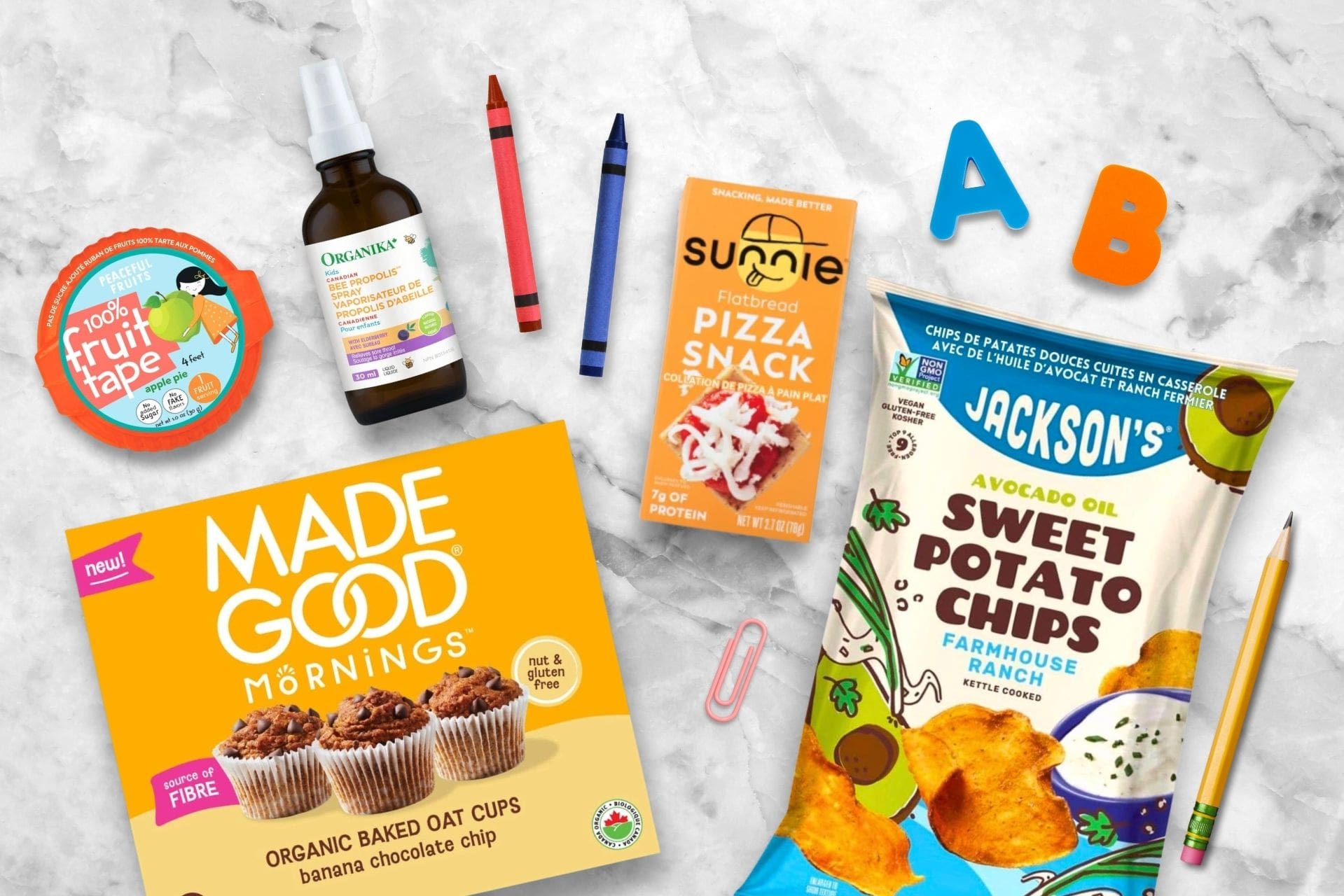
Smart School Snacks To Power Kids Through the Learning Day
Learn how the right snacks can boost kids’ focus, energy, and long-term health. This guide gives parents practical, science-backed tips for school nutrition that work in real life.
Back-to-school season brings familiar challenges. New shoes? Check. Fresh supplies? Done. But what about the fuel that keeps young minds sharp from morning bell to final dismissal? Snack time isn't just a break; it's brain food strategy in action.
Canadian parents juggle countless priorities each September morning. Coffee brewing, backpacks stuffed, permission slips signed. Yet one decision shapes the entire school day more than most realize: what goes in that lunchbox. Poor snack choices trigger afternoon meltdowns. Smart ones? They unlock focus, energy, and steady moods. Natura Market school snacks deliver exactly what families need: nutrition that doesn't require negotiation with picky eaters.
The Brain-Food Connection
Math class demands glucose. Reading comprehension needs steady blood sugar. Memory formation requires specific amino acids. When snacks deliver empty calories instead of real nutrition, academic performance nosedives predictably.
Teachers notice patterns immediately. Kids who eat protein-packed morning snacks stay engaged longer. Those surviving on sugar crashes struggle by lunch. The difference shows up in test scores, classroom behaviour, and homework completion rates.
Blood sugar stability explains everything. Refined sugars spike glucose rapidly, then crash hard. Complex nutrients provide sustained energy without dramatic fluctuations.
Real Nutrition Versus Marketing Hype
Healthy snacks share key traits. Protein content above 3 grams per serving. Fibre exceeding 2 grams. Minimal added sugars, ideally none. Recognizable ingredient lists without chemical tongue-twisters.
Protein builds growing bodies while stabilizing energy. Twelve essential amino acids can't be manufactured internally. Dietary sources become mandatory, not optional. Snacks lacking adequate protein leave kids cranky, unfocused, hungry again within hours.
Healthy fats support brain development directly. Omega-3 fatty acids improve memory formation, attention span, and emotional regulation. DHA specifically enhances learning capacity during critical developmental windows. Nuts, seeds, and certain fish deliver these compounds naturally.
Whole grains provide sustained glucose without insulin spikes. Steel-cut oats outperform instant varieties dramatically. Quinoa beats white crackers nutritionally. Brown rice trumps refined alternatives consistently. Processing destroys beneficial fibre, vitamins, and minerals.
Hidden sugars sabotage otherwise decent products. Corn syrup, dextrose, maltodextrin; dozens of names disguise the same problem. Total sugar content matters more than individual ingredient names. Anything exceeding 6 grams per serving raises red flags.
Practical Realities Shape Food Choices
Morning chaos doesn't accommodate elaborate meal prep. Forgotten lunchboxes happen weekly. Kids reject anything resembling vegetables instinctively.
Successful snack strategies work within these constraints rather than against them. Pre-portioned options eliminate morning decisions. Shelf-stable choices survive backpack abuse. Kid-friendly flavors prevent cafeteria trades for junk food.
Temperature control poses real challenges. Most schools lack adequate refrigeration. Perishable items spoil quickly in warm lockers. Room-temperature stability becomes essential for food safety, palatability.
Mess factor influences social dynamics too. Crumbly crackers embarrass kids during quiet reading time. Sticky fruit bars create playground problems. Clean-eating options preserve dignity while delivering nutrition.
Individual packaging serves multiple purposes beyond convenience. Portion control happens automatically. Cross-contamination risks decrease significantly. Sharing becomes simpler, safer for kids with allergies.
Energy density requirements vary by child, activity level, growth phase. Active eight-year-olds need different fuel than sedentary teenagers. Sports days demand higher calories. Testing periods benefit from brain-boosting nutrients specifically.
Weekly Planning Prevents Daily Stress
Random snack selection creates nutritional chaos. Monday's protein gets followed by Tuesday's sugar crash, Wednesday's empty calories. Strategic planning ensures balanced intake across time.
Rotation systems work brilliantly for busy families. Week one features nuts and seeds. Week two emphasizes whole-grain options. Week three highlights dried fruits and vegetable combinations. Patterns prevent boredom while covering nutritional bases systematically.
Special dietary needs require extra attention but shouldn't limit quality. Gluten-free doesn't mean nutrition-free. Dairy allergies won't prevent protein intake. Plant-based families access complete amino acid profiles through strategic combinations.
Activity schedules influence optimal snack timing too. Physical education days need pre-exercise fuel plus post-workout recovery foods. Academic testing benefits from steady-release carbohydrates. Field trips require portable, non-messy options that travel well.
Quality Standards Protect Growing Bodies
Organic certification guarantees specific production methods. No synthetic pesticides, herbicides, or genetic modification. Higher vitamin and mineral content in many cases. Environmental benefits matter for long-term planetary health too.
Third-party testing provides additional quality assurance. Heavy metal contamination affects many conventional products. Pesticide residues accumulate in developing tissues. Independent verification confirms company's claims accurately.
Allergen management becomes critical in school environments. Cross-contamination during manufacturing poses serious risks. Dedicated facilities eliminate exposure possibilities for sensitive children. Clear labelling helps parents make informed decisions confidently.
Sourcing transparency matters increasingly to conscious consumers. Fair trade practices support farming communities globally. Sustainable agriculture protects soil, water resources for future generations. Ethical business practices align with family values beyond simple nutrition.
Building Positive Food Relationships
Childhood food experiences shape adult preferences permanently. Early exposure to diverse, high-quality options creates lifelong healthy habits. Negative associations with nutritious foods prove difficult to reverse later.
Taste preferences develop through repeated positive encounters. When healthy snacks deliver satisfying flavours, textures, energy levels, kids request them voluntarily. Forced consumption of unpalatable "health foods" backfires spectacularly.
Variety exposure during developmental years expands palate into adulthood. Adventurous eating in childhood correlates with dietary flexibility throughout life. Limited early experiences create picky adult eaters resistant to change.
Canada's Premier Wellness Marketplace
Natura Market earned its reputation as Canada's most trusted health and wellness destination through unwavering commitment to quality, education, customer service excellence.
Their curated snack collection features brands parents recognize for consistent quality, such as:
Sustainable Changes Create Lasting Results
Dramatic dietary overhauls rarely succeed long-term. Sustainable improvement happens through gradual, consistent upgrades to existing habits. Small changes accumulate into significant health benefits over time.
Education empowers children to become nutrition advocates for themselves. Age-appropriate information about food's effects on energy, mood, and performance creates internal motivation for better choices.
Community support amplifies individual family efforts. Schools prioritizing nutrition education, parent groups sharing resources, and workplaces accommodating family meal prep time, environmental factors influence success significantly.
Consistency across different settings reinforces healthy patterns. Weekend snacks, summer camp lunches, sports team treats; maintaining standards beyond school hours strengthens habit formation.
Long-term thinking guides short-term decisions. Today's lunchbox contents influence tomorrow's health outcomes, academic success, and relationship with food extending into adulthood.
Beyond the School Day
Nutrition principles governing smart snack selection apply everywhere kids eat. Birthday parties, sleepovers, family road trips, restaurant visits; opportunities for reinforcement or sabotage occur constantly.
Athletic performance depends heavily on pre-, during, and post-exercise nutrition. Young athletes need specialized fuel matching their training demands, recovery requirements, growth needs simultaneously.
Emotional regulation connects directly to blood sugar stability. Mood swings, tantrum frequency, social interaction quality all improve with consistent, balanced nutrition throughout the day.
Sleep quality responds to dietary choices hours earlier. Late-afternoon sugar crashes disrupt evening routines. Proper snack timing and composition support healthy circadian rhythms naturally.
Academic achievement represents just one benefit of excellent nutrition. Confidence, energy levels, peer relationships, family dynamics, every aspect of childhood improves with better food choices.
Investment in Tomorrow Starts Today
School snacks represent daily opportunities to support developing minds, bodies, futures. Each choice either supports optimal development or creates unnecessary obstacles to success.
Quality nutrition during childhood pays dividends throughout life. Better bone density, cardiovascular health, metabolic function, cancer resistance, early investments compound over decades.
Cognitive development during school years shapes lifelong learning capacity. Adequate nutrition supports memory formation, problem-solving skills, creative thinking abilities that determine career possibilities.
Empowering Healthy Futures
Every lunchbox packed represents hope for the day ahead. Academic success, social confidence, physical energy, emotional stability; all supported by wise food choices made with love.
Canadian families deserve access to snack options that don't force compromise between health and convenience, nutrition and taste, quality and affordability. The right partnerships make excellent choices simple, sustainable, satisfying for everyone involved.
Transform your family's school nutrition strategy with expert guidance and premium products designed for real-world success. Contact Natura Market today to discover how simple changes to daily snack routines can unlock your child's full potential throughout their educational journey and beyond.
Disclaimer:
This blog does not provide medical advice, diagnosis, or treatment. Its content is for informational purposes only and should not be used as a substitute for professional healthcare guidance. Please consult a qualified physician or healthcare provider regarding any medical or dietary concerns. Any topics or product claims mentioned are not intended to diagnose, treat, cure, or prevent any disease. Always review product ingredients and nutrition labels to ensure they are appropriate for your individual needs.



